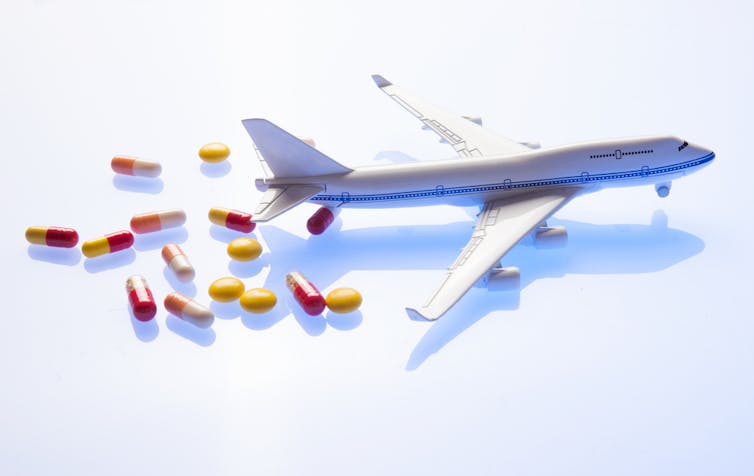Commonly recommended sleeping tablets aren't appropriate for plane travel. Here's why.

Every day, more than 10 million people take a flight somewhere in the world. While flying is relatively safe, the unique environmental conditions can put passengers at risk if they’re taking certain medications.
These include any hormone-based drugs, like the contraceptive pill and some fertility medicines, and drugs used to prevent heart attack and stroke. Antihistamines should also not be used to help passengers sleep during a flight.
What makes flying different from other forms of travel?
While flying is one of the safest forms of travel, there are specific risks that come with air travel, regardless of the length of the flight.
Passenger planes are typically pressurised to the same atmospheric conditions that are found at 10 000 feet altitude. At that level, the effective oxygen level is only 14.3%, which is much lower than the 20.9% found at ground level.
An additional risk is reduced blood flow from a lack of movement and sitting in cramped conditions, unless of course you’re fortunate enough to be in business or first class. And finally, dehydration is also a common side effect of flying due to the lack of humidity in the air.
When these conditions are combined, it results in an increased risk of deep vein thrombosis, which is also known as DVT. This is a type of blood clot that occurs in the veins deep in the body and occurs most often in the legs. The development of a blood clot can result in blocked blood flow to the lungs, heart, or brain, which in turn can cause a heart attack or stroke.
Contraceptive pill and other hormone-based medicines
Given the inherent risk of a blood clot when flying, a passenger should use with caution any medication that can further increase the risk of a clot.
Some brands of contraceptive for women (tablet or implant formulation) are known to increase the chances of a blood clot, although the overall increase in risk is small. While it’s thought the major risk comes from the hormone estrogen, a review of all the medical evidence in 2014 showed there’s a risk of blood clot from all contraceptive medicines.

It’s important you talk to your doctor about flying if you take hormonal medicines. Picture: Shutterstock
Likewise, hormone replacement therapy, particularly those that include estrogen, or some fertility medicines, such as gonadotrophins, can increase the risk of a blood clot.
If you take one of these medicines, it does not mean you cannot fly, nor that you should necessarily stop taking the drug. Many millions of women fly while taking these medicines and suffer no ill effects.
But the risk is also increased if you have an underlying health condition that includes type II diabetes, heart disease, and prior heart attacks or strokes. As such, passengers who also take medications to help prevent heart attacks and strokes should consult their doctor or pharmacist before flying.
If you’re at increased risk of a blood clot, then an anti-platelet medication may be suitable for you. These medicines act by stopping the blood cells from sticking together and include prescription medicines such as warfarin and clopidogrel, and over-the-counter medicines such as low dose aspirin.
Antihistamines
Many passengers can have trouble sleeping when flying, especially on long-haul flights. Parents flying with young children can also be concerned about them not sleeping or being unsettled and annoying other passengers.
In these instances, many will turn to sedating antihistamines, like promethazine to try to induce sleep. But this is a bad option.
The Australian Medical Association specifically recommends parents do not do this, as sometimes it can have the reverse effect and make children less sleepy and more active. These types of antihistamines are also known to depress breathing, and in the low oxygen environment of the aircraft this can be especially dangerous.
If you feel you or another family member will need sedation when flying, don’t use an antihistamine. Consult your doctor or pharmacist for a more suitable medication. Examples include prescription sleeping tablets, such as melatonin, or natural remedies, such as valerian.
What to do before and during your flight
Before you fly, if you’re taking any form of medication, it’s recommended you meet with your doctor or pharmacist to discuss the suitability of your medicines. They may advise you there’s little risk for you, or if there is a risk, they may recommend a different medicine for the trip or recommend a new medicine to reduce the risk of blood clots.
During your flight, don’t take antihistamines, and reduce your chance of a blood clot by drinking lots of water, stretching in your seat, and moving about the cabin as much as is appropriate.
Finally, the effects of alcohol can be increased when flying – so drink in moderation, and try to avoid tea, coffee, and other caffeinated drinks as these can have dehydrating effects and make it harder to sleep.
Nial Wheate, Associate Professor | Program Director, Undergraduate Pharmacy, University of Sydney
This article was originally published on The Conversation. Read the original article.
Support Local Journalism
Add The Citizen as a Preferred Source on Google and follow us on Google News to see more of our trusted reporting in Google News and Top Stories.






